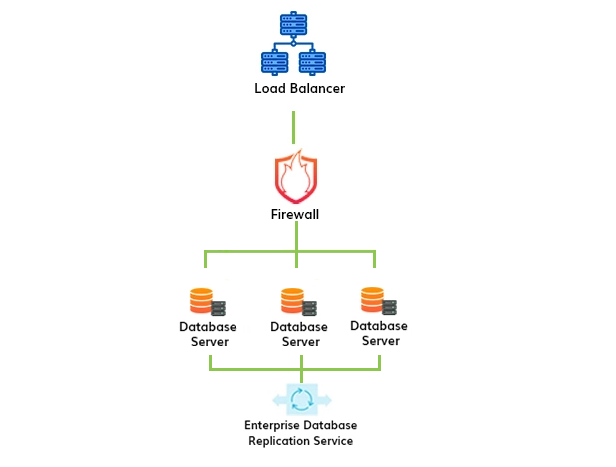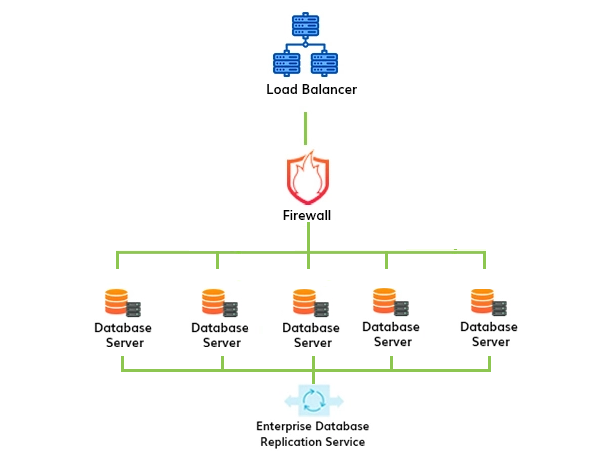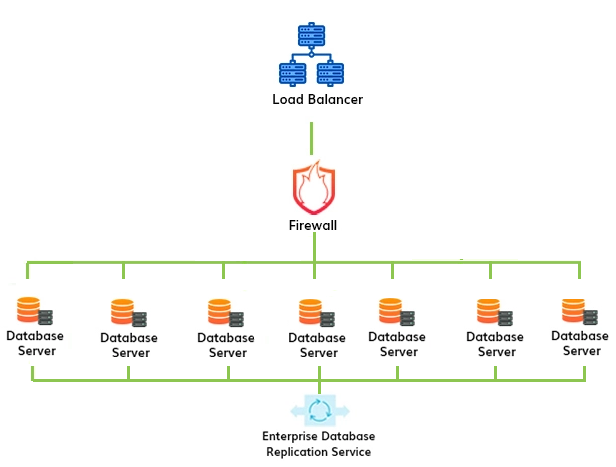India’s Most Simplified and Innovative Database Clusters Platform
HostingRaja delivers database cluster hosting services that provide a secure and scalable environment for businesses to store and manage their data. Their solutions are designed to meet the needs of businesses of all sizes, offering features such as automatic failover, load balancing, and data replication. These features optimize performance and ensure the system’s reliability, even during periods of high demand. With HostingRaja’s database cluster hosting, businesses can effectively handle their data requirements, benefit from seamless scalability, and enjoy a dependable hosting environment.
HostingRaja’s database cluster hosting solutions empower customers to prioritize their core business operations while leaving data management and infrastructure concerns in capable hands. Their dedicated technical support team is available round-the-clock, providing prompt assistance and ensuring optimal performance of customers’ databases. With HostingRaja’s reliable support and expertise, businesses can have peace of mind knowing that their databases are running smoothly and efficiently. This allows customers to maximize their productivity and focus on driving their business growth without the burden of managing their database infrastructure.
What is Database Clusters?
A database cluster is a group of database servers or nodes that work together to store and manage data. In a database cluster, data is distributed across multiple nodes, and the nodes work together to ensure that the data is consistent and available and theDatabase clusters are used to handle large amounts of data and high traffic loads more efficiently than single-server databases. By distributing data across multiple nodes, database clusters can handle more requests and process more data in parallel, resulting in improved scalability and performance.
Database Clusters Features
Database clusters can handle large amounts of data and traffic loads more efficiently than single-server databases. As the amount of data grows, more nodes can be added to the cluster to handle the increased load, resulting in improved scalability.
Database clusters are designed to provide high availability by ensuring that data is available even if one or more nodes in the cluster fail. If a node fails or becomes unavailable, other nodes in the cluster can continue to handle requests, ensuring high availability.
Database clusters enhance performance through distributed data and processing, reducing query response times, latency, and improving scalability, fault tolerance, load balancing, data availability, high concurrency, efficiency, reliability, and security.
In a database cluster, all nodes maintain identical copies of data, ensuring up-to-date and consistent information across the cluster. This synchronization minimizes the risk of data inconsistencies and errors, providing reliable and accurate data access.
Database clusters partition data across nodes, optimizing performance by minimizing data access. This leads to faster query processing and improved response times. By distributing data efficiently, database clusters enhance overall system performance.
Database clusters distribute traffic and workload across multiple nodes, improving performance and preventing node overload. This balanced distribution optimizes resource utilization and ensures efficient processing of queries , and enhancing system performance.
3 Node Cluster
3 Database Servers
Load Balancer (FREE)
Firewall
5 Node Cluster
5 Database Server
Load Balancer (FREE)
Firewall
7 Node Cluster
7 Database Servers
Load Balancer (FREE)
Firewall
Benefits of Database Cluster Services
Improved scalability and performance:
In a database cluster, the ability to handle scalability challenges is a standout feature. By distributing both data and workload across multiple nodes, the cluster can effectively manage increasing data volumes and traffic. This flexibility enables seamless expansion as additional nodes can be added to the cluster. As a result, the database cluster maintains efficient performance even under demanding high load conditions. This distributed architecture optimizes resource utilization and enhances scalability, making it a valuable solution for organizations with growing data needs.
High availability and fault tolerance:
The distributed nature of a database cluster service ensures high availability, making it a reliable solution for organizations. In the event of a node failure or issue, the remaining nodes in the cluster seamlessly take over the workload, guaranteeing uninterrupted access to the database. This fault tolerance capability enhances system reliability by minimizing disruptions and reducing the risk of downtime. Organizations can rely on the continuous availability provided by a database cluster service to ensure smooth operations and data accessibility. The distributed architecture of the cluster effectively mitigates single points of failure, enhancing overall system resilience.
Enhanced data consistency and reliability:
Data replication and synchronization mechanisms in database clusters play a vital role in maintaining data consistency across nodes. Each node holds an identical and current copy of the data, ensuring consistency throughout the cluster. In the event of node failures, the replicated data stored on other nodes remains accessible, significantly reducing the risk of data loss. This robust data redundancy and synchronization enhance overall data reliability, ensuring that critical information remains intact and available for retrieval and analysis. Organizations can rely on the data integrity provided by database clusters to support their operations and decision-making processes. The distributed nature of the cluster enables continuous data availability and resilience against node failures, contributing to a more reliable and dependable data management solution.
Efficient Database management:
By harnessing the combined capabilities of multiple nodes, a database cluster service excels in managing substantial data volumes. The workload is intelligently distributed across nodes, enabling parallel processing and expediting data retrieval and analysis. This streamlined approach significantly enhances the efficiency of data management operations, such as executing queries, performing updates, and handling data-intensive tasks. Organizations benefit from the improved responsiveness and accelerated processing times offered by a database cluster service, empowering them to efficiently handle and extract value from their vast datasets. Leveraging the parallel processing capabilities of the cluster ensures optimal utilization of resources, resulting in enhanced productivity and faster data-driven decision-making.
Flexible Scalable Storage of Database Cluster:
Database cluster services leverage the collective power of multiple nodes to efficiently manage large data volumes. The workload is distributed across nodes, enabling parallel processing and speeding up data retrieval and analysis. This approach greatly improves the efficiency of data management operations, including query execution, updates, and handling data-intensive tasks. Organizations can benefit from faster processing times and increased responsiveness, allowing them to effectively handle and derive insights from their extensive datasets. By harnessing the parallel processing capabilities of a database cluster service, organizations can optimize resource utilization, leading to enhanced productivity and quicker data-driven decision-making.
Agile and Secure Data of Database Cluster
Database Cluster Mobility
Database clusters Mobility can be moved between different infrastructure environments like data centers, clouds, or hybrid setups. This portability feature allows organizations to easily shift their database systems without data loss or disruptions. It provides flexibility to adapt to changing business requirements and take advantage of different hosting options. With portable clusters, companies can efficiently manage and scale their databases while ensuring data integrity and minimizing transition complexities.
Versatile Database Cluster Flexibility
Database clusters can adapt to varying demand and resource availability by being flexible in their scaling capabilities. This means they can easily expand or shrink in size as needed. Technologies like horizontal scaling, sharding, and load balancing enable clusters to handle increased workloads or optimize resource usage. This flexibility ensures efficient performance and cost-effective resource utilization in response to changing database requirements.
Multi-Cloud Database Cluster Capability
Multi-cloud capability of database clusters allows them to function across multiple cloud computing platforms simultaneously. This means that organizations can store, process, and access data from different cloud providers, granting them more flexibility and control over their cloud infrastructure. It enables the distribution of data and workload across various cloud environments, maximizing scalability, and minimizing vendor lock-in. With multi-cloud database clusters, businesses can leverage the strengths of multiple cloud platforms for improved agility and resilience.
Clustered Database Excellence
Organizations can enhance the performance and reliability of their database clusters by utilizing multiple cloud providers. This approach allows them to take advantage of the unique strengths and capabilities offered by each provider. By distributing their database workload across multiple clouds, organizations can optimize performance, ensure high availability, and mitigate risks associated with a single provider. This strategy enables organizations to tailor their infrastructure to specific needs and leverage the best features of each cloud provider for an optimized database environment.
Increased data security and compliance
Organizations can enhance data security and compliance by leveraging multiple cloud providers. By implementing data redundancy across different geographic regions and cloud platforms, organizations ensure that their data is securely stored and protected. This strategy minimizes the risk of data loss or disruptions, improves disaster recovery capabilities, and helps organizations meet regulatory compliance requirements. Utilizing multiple cloud providers offers an extra layer of protection, reducing vulnerabilities and enhancing overall data security measures.
How can a MongoDB cluster improve the scalability and performance of web applications?
A MongoDB clustercan enhance the scalability and performance of web applications by dividing the workload among multiple nodes. This allows for horizontal scaling, where more nodes can be added to handle increased traffic. The cluster also ensures automatic failover, seamlessly switching to a backup node in case of any issues. Additionally, efficient data distribution and replication techniques are employed, ensuring data consistency and availability across the cluster. Overall, the MongoDB cluster optimizes performance and provides a robust foundation for web applications to handle growing demands.
How does a cluster improve the availability and reliability of web applications?
A cluster enhances the availability and reliability of web applications by spreading the workload across multiple servers. This means that if one server fails, the others can continue serving requests, ensuring uninterrupted service. The cluster also provides redundancy and fault tolerance, which means that even if a server goes down, there are backup servers ready to take over. Additionally, the cluster enables seamless maintenance and upgrades without affecting the application’s availability, as the workload is automatically shifted to other servers
HostingRaja DataBase Cluster FAQ’s
What are the advantages of using a database cluster service?
Some advantages of using a database cluster service include improved scalability to handle growing data and traffic, high availability with automatic failover capabilities, data redundancy for increased data reliability, simplified management and administration, and better performance through load balancing and distributed computing.
How does a database cluster service ensure high availability?
A database cluster service ensures high availability by replicating data across multiple nodes within the cluster. If one node fails, the service automatically redirects requests to a healthy node, ensuring uninterrupted access to the database. This redundancy and automatic failover mechanism minimize downtime and provide continuous availability.
What is data sharding in a database cluster?
Data sharding is a technique used in database clusters to horizontally partition data across multiple nodes based on a shard key. Each shard contains a subset of the data, allowing for parallel processing and improved scalability. Data sharding helps distribute the workload across nodes and enhances query performance.
Can a database cluster service handle different types of databases?
Yes, a database cluster service can handle different types of databases depending on the service provider. Some database cluster services support specific database management systems (DBMS) like MySQL, PostgreSQL, or MongoDB, while others provide a more generic clustering solution that can be used with various DBMS.
What are the scalability options with a database cluster service?
A database cluster service typically offers horizontal scalability, allowing you to add or remove nodes from the cluster as your data and traffic requirements change. This scalable architecture ensures that the database can handle increased workload and provides flexibility for future growth.
Is data consistency maintained in a database cluster?
Yes, maintaining data consistency is a crucial aspect of a database cluster. Database cluster services use replication mechanisms, distributed transaction protocols, and consensus algorithms to ensure that data modifications are synchronized across all nodes. This guarantees data consistency and integrity in a distributed environment.
Can I perform backups and restores in a database cluster service?
Yes, most database cluster services provide backup and restore mechanisms. These services often offer automated backup schedules, snapshots, and point-in-time recovery options to protect your data. It's important to review the backup and restore capabilities provided by the specific database cluster service you are using.
What level of security is provided by a database cluster service?
Database cluster services typically offer robust security features, including encryption at rest and in transit, access controls, authentication mechanisms, and auditing capabilities. Additionally, they often comply with industry standards and regulations to ensure data security and privacy.
What are the cost implications of using a database cluster service?
The cost of using a database cluster service depends on factors such as the service provider, the chosen configuration, the number of nodes, and the amount of data stored and transferred. Pricing models can vary, including pay-as-you-go, tiered pricing, or fixed monthly costs. It's important to review the pricing details provided by the database cluster service to understand the cost implications.
Reviews from customers
-

Partha Banerjee
20 Jan 2025Their prompt response, technical skills, and excellent customer service have greatly contributed to the smooth operation of our systems. We greatly appreciate your willingness to go above and beyond to assist us with even the most challenging issues. Your ability to convey complex technical information in a manner that is easily understandable has proven to be extremely helpful. Throughout the entire process, we have been impressed by your patience and professionalism. We are particularly grateful for your proactive approach to problem-solving. Your ability to identify and address potential issues before they escalate into major problems has saved us a significant amount of time and resources. Your dedication and commitment to our organization have not gone unnoticed. We consider you to be a valuable asset to Hosting Raja, and we feel fortunate to have you as part of our team. Your hard work and dedication are greatly appreciated. G-Suite from Hosting Raja, where I had to reach out to them because I wanted to have both webmail and G-Suite for my mail services. They assisted me in enabling split end delivery, and now I can use both email services. It is always easy to approach them as they provide an immediate response from the team.
-

Soniya Ganesh
11 Jan 2025I was using a single web server, and unfortunately, my website was slow. However, when I discussed this issue with the sales team at HostingRaja, they suggested implementing a Database cluster. I followed their advice, and I’m pleased to say that my issue has been resolved. Not only is the slowness issue, traffic to my site now smooth and the server response has also significantly improved. I would like to extend my gratitude to the sales team for their valuable suggestion. hosted my server from other vendor and I have purhased G-suite from hostingraja suggested by a friend, so i had to migrate from webmail mails to G-SUITE and they have helped me out in transfering the data completely, without missing any of them.




